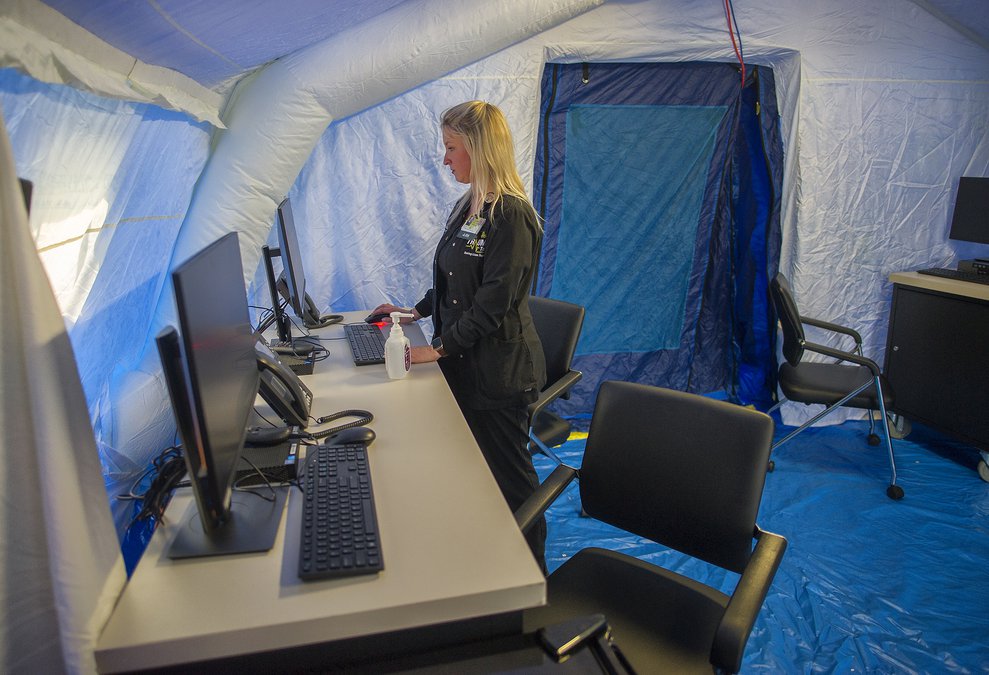Last weekend, Gov. Brian Kemp announced the state was capable of processing about 100 COVID-19 tests per day, with the expectation that 200 per day would be possible by this week.
Georgia has 159 counties. Assume the number is 200 tests processed per day. Do the math.
As a rough average, the state can process fewer than two tests, per county, per day.
That number will keep climbing as more processing operations come online. The good news is that, as of Friday, there was no backlog of tests awaiting processing. But the bad news is the public remains focused on being tested, when that doesn’t need to be the focus at all.
Through casual conversation, social media, and in some cases public outrage, the same question is being asked: Why aren’t they testing more people?
And the answer is really fairly simple. The capacity to process testing isn’t available and, for right now, testing isn’t the priority. Getting tested isn’t going to stop the virus. There is no drug yet available to give patients who test positive for COVID-19, so an official determination that it is or is not present is not the most important thing right now.
Which isn’t to say testing isn’t important. Obviously it is. Test result data is needed to track the disease, to see if efforts to curb it are working, to provide medical personnel and patients with validation of their suspicions. It is vital.
The Times editorial board
Staff members
- Norman Baggs, general manager
- Shannon Casas, editor in chief
Community members
- Cheryl Brown
- David George
- Mandy Harris
- Brent Hoffman
- J.C. Smith
- Tom Vivelo
But the priority is stopping the spread of the disease, and the best way to do that is to follow the direction of the CDC and medical experts at every level — continue to social distance yourself from others, follow the guidelines for limiting personal interactions, keep yourself and your surroundings germ free and focus with fierce determination on reducing the number of people who become infected with the virus.
That’s far more important than worrying about testing.
The obsession with testing also puts an unnecessary strain on health care providers who, frankly, in many cases have more important things to worry about.
At this point, there is little need to recite the latest numbers on the cases that have been confirmed and the deaths recorded, because those totals are changing by the hour. The number of confirmed cases is climbing as more tests are done and the disease continues to spread; the number of deaths is increasing and is going to continue to do so for a while.
The fact that most of those who are infected will be fine and may have mild, or no, symptoms makes it harder to get across the message that as carriers of the virus they can easily infect others who may die from the infection.
The carefree gang who thinks it is still fine to gather for weekly trivia at the local watering hole chooses to ignore the potential damage that can be done by their nonchalant attitude toward the sickness that is racing around the world at an incredible pace and leaving thousands dead in its wake.
Health care professionals understand. They see what is looming on the horizon. They anticipate the shortages of beds, lack of supplies, need for equipment and climbing death toll. They understand that when a huge volume of people is infected, that even if only a small percentage is seriously impacted, that ultimate number is incredibly high. A small percentage of a gigantic number is still a big number.
So quit badgering health care providers about getting tested and pay more attention to reducing the climb in the number of cases. We can’t get a handle on this thing until the number of new cases starts to decrease.
We should all take the time to thank those who do put themselves at risk in order to provide health care for the masses. Too often we take for granted the sacrifices we ask them to make, sometimes forcing them to put themselves and their families in danger of infection simply because we refuse to do the right thing ourselves.
It’s easy to jump on social media and complain that a hospital room wasn’t sufficiently clean three years ago, or that a cousin’s second wife’s stepson’s child had a bad reaction to a drug administered in the ER. But that does nothing to advance the cause at hand, which is providing all the support we can for overwhelmed providers who hourly are forced to make decisions with life or death ramifications.
Nurses, technicians, doctors, orderlies, administrators, EMTs, first responders, those in public safety, all of those who can’t work from home, who can’t keep their distance from others, who can’t avoid interacting with the infected and contagious, all deserve our thanks, our appreciation and our prayers.
At this point, the test that matters most is whether as a community, as a society, we care enough about our fellow man to do the things necessary to stop the virus from spreading to others. Any other course of action is selfish, self-centered and short-sighted.

